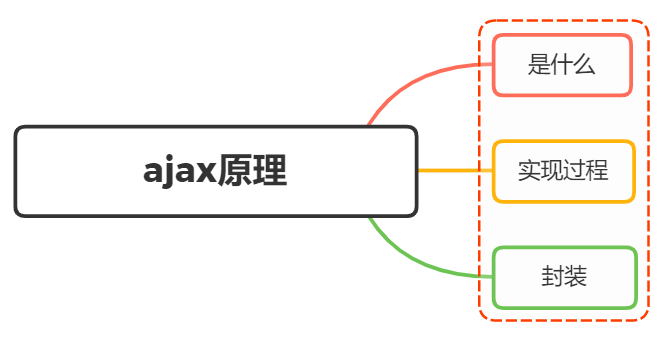面试官:ajax原理是什么?如何实现?

一、是什么
AJAX 全称(Async Javascript and XML)
即异步的 JavaScript 和 XML,是一种创建交互式网页应用的网页开发技术,可以在不重新加载整个网页的情况下,与服务器交换数据,并且更新部分网页
Ajax的原理简单来说通过XmlHttpRequest对象来向服务器发异步请求,从服务器获得数据,然后用JavaScript来操作DOM而更新页面
流程图如下:

下面举个例子:
领导想找小李汇报一下工作,就委托秘书去叫小李,自己就接着做其他事情,直到秘书告诉他小李已经到了,最后小李跟领导汇报工作
Ajax请求数据流程与“领导想找小李汇报一下工作”类似,上述秘书就相当于XMLHttpRequest对象,领导相当于浏览器,响应数据相当于小李
浏览器可以发送HTTP请求后,接着做其他事情,等收到XHR返回来的数据再进行操作
二、实现过程
实现 Ajax 异步交互需要服务器逻辑进行配合,需要完成以下步骤:
创建
Ajax的核心对象XMLHttpRequest对象通过
XMLHttpRequest对象的open()方法与服务端建立连接构建请求所需的数据内容,并通过
XMLHttpRequest对象的send()方法发送给服务器端通过
XMLHttpRequest对象提供的onreadystatechange事件监听服务器端你的通信状态接受并处理服务端向客户端响应的数据结果
将处理结果更新到
HTML页面中
创建XMLHttpRequest对象
通过XMLHttpRequest() 构造函数用于初始化一个 XMLHttpRequest 实例对象
const xhr = new XMLHttpRequest();const xhr = new XMLHttpRequest();与服务器建立连接
通过 XMLHttpRequest 对象的 open() 方法与服务器建立连接
xhr.open(method, url, [async][, user][, password])xhr.open(method, url, [async][, user][, password])参数说明:
method:表示当前的请求方式,常见的有GET、POSTurl:服务端地址async:布尔值,表示是否异步执行操作,默认为trueuser: 可选的用户名用于认证用途;默认为`nullpassword: 可选的密码用于认证用途,默认为`null
给服务端发送数据
通过 XMLHttpRequest 对象的 send() 方法,将客户端页面的数据发送给服务端
xhr.send([body])xhr.send([body])body: 在 XHR 请求中要发送的数据体,如果不传递数据则为 null
如果使用GET请求发送数据的时候,需要注意如下:
- 将请求数据添加到
open()方法中的url地址中 - 发送请求数据中的
send()方法中参数设置为null
绑定onreadystatechange事件
onreadystatechange 事件用于监听服务器端的通信状态,主要监听的属性为XMLHttpRequest.readyState ,
关于XMLHttpRequest.readyState属性有五个状态,如下图显示

只要 readyState 属性值一变化,就会触发一次 readystatechange 事件
XMLHttpRequest.responseText属性用于接收服务器端的响应结果
举个例子:
const request = new XMLHttpRequest()
request.onreadystatechange = function(e){
if(request.readyState === 4){ // 整个请求过程完毕
if(request.status >= 200 && request.status <= 300){
console.log(request.responseText) // 服务端返回的结果
}else if(request.status >=400){
console.log("错误信息:" + request.status)
}
}
}
request.open('POST','http://xxxx')
request.send()const request = new XMLHttpRequest()
request.onreadystatechange = function(e){
if(request.readyState === 4){ // 整个请求过程完毕
if(request.status >= 200 && request.status <= 300){
console.log(request.responseText) // 服务端返回的结果
}else if(request.status >=400){
console.log("错误信息:" + request.status)
}
}
}
request.open('POST','http://xxxx')
request.send()三、封装
通过上面对XMLHttpRequest 对象的了解,下面来封装一个简单的ajax请求
//封装一个ajax请求
function ajax(options) {
//创建XMLHttpRequest对象
const xhr = new XMLHttpRequest()
//初始化参数的内容
options = options || {}
options.type = (options.type || 'GET').toUpperCase()
options.dataType = options.dataType || 'json'
const params = options.data
//发送请求
if (options.type === 'GET') {
xhr.open('GET', options.url + '?' + params, true)
xhr.send(null)
} else if (options.type === 'POST') {
xhr.open('POST', options.url, true)
xhr.send(params)
//接收请求
xhr.onreadystatechange = function () {
if (xhr.readyState === 4) {
let status = xhr.status
if (status >= 200 && status < 300) {
options.success && options.success(xhr.responseText, xhr.responseXML)
} else {
options.fail && options.fail(status)
}
}
}
}//封装一个ajax请求
function ajax(options) {
//创建XMLHttpRequest对象
const xhr = new XMLHttpRequest()
//初始化参数的内容
options = options || {}
options.type = (options.type || 'GET').toUpperCase()
options.dataType = options.dataType || 'json'
const params = options.data
//发送请求
if (options.type === 'GET') {
xhr.open('GET', options.url + '?' + params, true)
xhr.send(null)
} else if (options.type === 'POST') {
xhr.open('POST', options.url, true)
xhr.send(params)
//接收请求
xhr.onreadystatechange = function () {
if (xhr.readyState === 4) {
let status = xhr.status
if (status >= 200 && status < 300) {
options.success && options.success(xhr.responseText, xhr.responseXML)
} else {
options.fail && options.fail(status)
}
}
}
}使用方式如下
ajax({
type: 'post',
dataType: 'json',
data: {},
url: 'https://xxxx',
success: function(text,xml){//请求成功后的回调函数
console.log(text)
},
fail: function(status){////请求失败后的回调函数
console.log(status)
}
})ajax({
type: 'post',
dataType: 'json',
data: {},
url: 'https://xxxx',
success: function(text,xml){//请求成功后的回调函数
console.log(text)
},
fail: function(status){////请求失败后的回调函数
console.log(status)
}
})